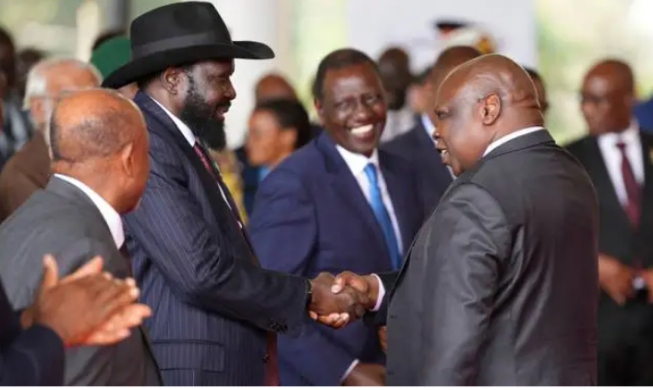The South Sudanese peace talks, once on the cusp of a breakthrough, are now teetering on the edge of collapse due to a newly passed bill that opposition groups vehemently oppose.
The controversial legislation, which permits detention without an arrest warrant, has become a major sticking point, threatening to derail the delicate negotiations.
For months, Kenya has played host to high-level meetings aimed at reconciling South Sudan’s government with rebel factions excluded from the 2018 peace agreement.
This prior accord ended a brutal five-year civil war that claimed approximately 400,000 lives and displaced millions. However, despite the ceasefire, sporadic violence continues to plague the nation of nine million.
Pagan Amum Okiech, representing the South Sudan Opposition Movement Alliance, expressed the gravity of the situation late Tuesday, telling The Associated Press, “It would be meaningless to sign any agreement if the draconian National Security Act is signed into law by the president.”
The contentious bill, originally introduced in 2015, was passed by parliament last week and now awaits President Salva Kiir’s signature.
He has 30 days to either approve or reject the legislation, which has become a focal point of international and domestic scrutiny, especially with the country’s first-ever election scheduled for December 22.
“This law violates the fundamental rights and freedoms of South Sudanese citizens. It eliminates civic and political space,” Amum declared. “There can be no peace or democracy under such a law.”
The atmosphere in Juba is charged, with both negotiators and civilians anxiously awaiting the president’s decision. Among those vocal in their criticism is Edmund Yakani, executive director of the Community Empowerment for Progress Organization. The non-profit, which engages university students and fresh graduates, has taken a firm stand against the bill.
“This security bill has created a negative spirit for the negotiations,” Yakani said. “It threatens to undo the progress we’ve made and casts a dark shadow over the upcoming election.”
Human Rights Watch echoed these concerns, urging President Kiir to veto the bill. The organization warned that enacting the law would further erode human rights in a country already marred by a history of abuses committed by national security agencies.
Western envoys have also weighed in, suggesting that the election be postponed to ensure a free and fair process. Their recommendations, however, have met with resistance from President Kiir, who remains steadfast in his commitment to hold the election in December.
In a recent address, Kiir dismissed the calls for delay, underscoring the importance of adhering to the electoral timeline. “We cannot keep postponing our democratic process,” he asserted. “The people of South Sudan deserve the right to choose their leaders without further delay.”
The international community watches closely, aware that the stakes could not be higher. A failure to reach an agreement could plunge South Sudan back into the depths of conflict, undoing years of painstaking diplomatic efforts.
On the ground in Juba, the tension is palpable. Citizens are deeply divided over the bill, with many fearing that its passage could herald a return to the authoritarian practices that characterized the civil war years.
“It’s a step backward,” said John Deng, a local activist. “We fought hard for our freedom, and now it feels like we’re losing it again.”
As the deadline for the president’s decision looms, the focus remains on the peace talks in Kenya. Mediators are working tirelessly to bridge the divide between the government and opposition groups, but the shadow of the National Security Act hangs heavy over the negotiations.
For South Sudan, the coming weeks are critical. The choices made now will determine the country’s trajectory—toward peace and democracy or back into the chaos and violence of its past. The world holds its breath, hoping that wisdom and compromise will prevail, ensuring a future where South Sudanese can live free from fear and oppression.




